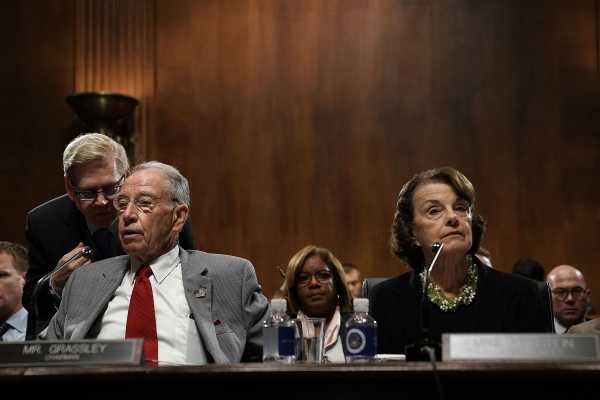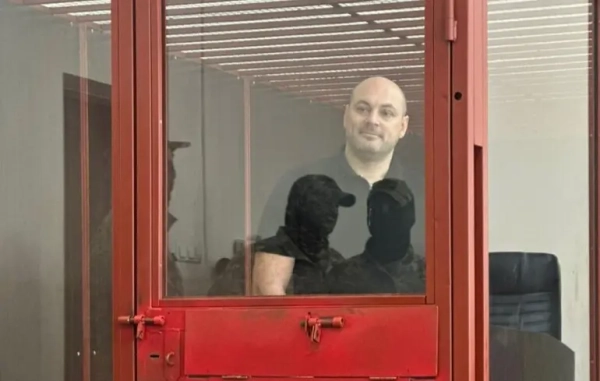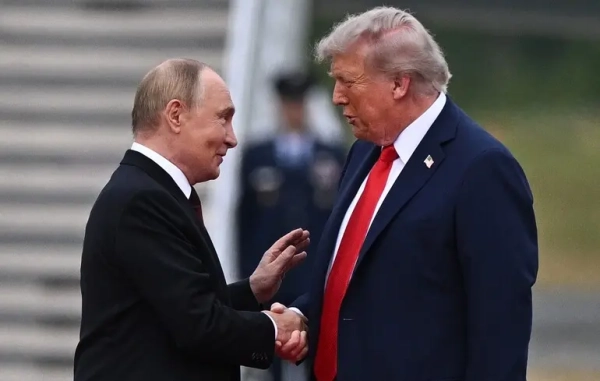
Even after Palo Alto University professor Christine Blasey Ford levied sexual assault allegations against Brett Kavanaugh, his nomination for the Supreme Court is still on track for a vote in the Senate Judiciary Committee on Thursday — but first the senators have some questions.
The committee’s in the process of scheduling phone calls with Kavanaugh and Ford, after she came forward in a Washington Post report on Sunday, alleging that Kavanaugh drunkenly pinned her down and sexually assaulted her when they were both teenagers in the 1980s.
Following the publication of that report, Senate Democrats have been arguing for a delay in Kavanaugh’s confirmation process — something that Republicans continue to balk at. While a spokesman for Judiciary Chair Chuck Grassley signaled that there are no plans to push a Kavanaugh committee vote scheduled for this Thursday, he noted there is bipartisan interest in conducting further review of the recent revelations.
“The Chairman and Ranking Member routinely hold bipartisan staff calls with nominees when updates are made to nominees’ background files,” Grassley spokesperson Taylor Foy said in a statement. “Given the late addendum to the background file and revelations of Dr. Ford’s identity, Chairman Grassley is actively working to set up such follow-up calls with Judge Kavanaugh and Dr. Ford ahead of Thursday’s scheduled vote.”
By conducting these calls — if they take place — lawmakers will be able to weigh both Ford’s allegations and Kavanaugh’s response as part of their evaluation of his candidacy for the high court. Ford had initially raised the sexual assault allegations in a letter that Sen. Dianne Feinstein (D-CA) referred (without Ford’s name) to the FBI last week. At that time, the FBI said it had added the letter to Kavanaugh’s background file, meaning that the White House and other Senators would be able to access it. An agency spokesperson said it had no additional guidance to provide following the Washington Post report on Sunday.
Ford said she had originally wanted to remain anonymous out of fear of retaliation and public attacks but ultimately decided “my civic responsibility is outweighing my anguish and my terror about retaliation.”
Kavanaugh’s confirmation hearing already took place in early September, where senators questioned him about his record, beliefs, and past for days. In response to the then-anonymous allegations last week, Grassley had his office publish a letter signed by 65 women Kavanaugh knew in high school saying he “treated women with respect.”
Democrats quickly demanded a delay in Kavanaugh’s confirmation vote
After the Post’s story broke on Sunday, reactions poured in from the senators who will ultimately decide whether Kavanaugh, President Donald Trump’s second Supreme Court nominee, will be confirmed — at least on the Democratic side.
Senators on the left called for the nomination to be slowed down until an investigation could be conducted. Republicans, meanwhile, were slower to respond, although Sen. Jeff Flake (R-AZ) threw many off by emphasizing that he was opposed to moving forward with a vote on Kavanaugh without hearing from Ford, Politico reports. “If they push forward without any attempt with hearing what she’s had to say, I’m not comfortable voting yes,” Flake said.
Feinstein, the ranking member of the judiciary committee who who kept Ford’s identity confidential but did submit her allegation to the FBI, said that the professor’s decision to come forward was “extraordinarily difficult” in a statement. She also said the bureau should investigate her claims before the Senate moves forward with Kavanaugh’s nomination.
“From the outset, I have believed these allegations were extremely serious and bear heavily on Judge Kavanaugh’s character. However, as we have seen over the past few days, they also come at a price for the victim,” she said. “I hope the attacks and shaming of her will stop and this will be treated with the seriousness it deserves.”
Sen. Kamala Harris (D-CA), a member of the Senate Judiciary Committee, called for a delay until there is an investigation as well, citing the Senate’s “constitutional responsibility” to scrutinize Supreme Court nominees. So did Sen. Mazie Hirono (D-HI), also on the committee, and multiple other Senate Democrats and judiciary committee members.
Senate Minority Leader Chuck Schumer (D-NY) in a statement also called for a postponement of the vote on Kavanaugh. “To railroad a vote now would be an insult to the women of America and the integrity of the Supreme Court,” he said.
Alabama Democratic Sen. Doug Jones before Ford’s identity was revealed on Sunday predicted Kavanaugh’s nomination would likely move forward in an appearance on CNN’s State of the Union — unless the accuser was revealed. “There’s really not much that can be done unless this person comes forward and you can see this and talk to the person who wrote that letter,” he said. After Ford came forward, he called for a delay in the nomination.
Republicans have been slower to weigh in
While a chorus of Democratic lawmakers quickly rose up, Republicans in the Senate and the administration were quieter.
One of the few immediate responses came from Foy, who took a swipe at Senate Democrats for keeping Ford’s allegations under wraps and suggested they were politically motivated to do so. In a statement Foy said the “uncorroborated allegations from more than 35 years ago” are “disturbing.” (Ford did not tell anyone about the alleged incident when it first happened in the 1980s, but she discussed it in therapy in 2012 and 2013 without naming Kavanaugh, and her therapists’ notes from the time corroborate that.)
“Judge Kavanaugh’s background has been thoroughly vetted by the FBI on six different occasions throughout his decades of public service, and no such allegation ever surfaced,” Foy said.
South Carolina’s Lindsey Graham said in a statement that he agreed with the committee’s concerns about the “substance and process” of the allegations but said he would “gladly listen” to Ford to hear what she has to say. “If the committee is to hear from Ms. Ford it should be done immediately so the process can continue as scheduled,” he said.
Republican Sens. Susan Collins of Maine and Lisa Murkowski of Alaska, considered to be the two swing votes in Kavanaugh’s confirmation, have yet to publicly comment. Many of their fellow GOP lawmakers have thus far held off as well.
North Carolina Republican Sen. Thom Tillis said on CBS’s Face the Nation on Sunday prior to the Post’s story that he hadn’t seen the letter and criticized the process that kept it under wraps. “So we have a confidential witness not willing to sit down at least in a closed setting — that’s problematic to me,” he said. “And as you said Judge Kavanaugh has categorically denied the allegations and I put some weight on that.”
It’s not clear whether Ford coming forward has changed his calculation.
The White House has not yet put out a statement beyond reiterating Kavanaugh’s denial when contacted by the Post. The FBI, which handles background checks on government appointees, had previously said it added Ford’s original letter to Kavanaugh’s file, meaning the White House and other senators will be able to review it, and a spokeperson said they had no other guidance to provide.
White House spokespeople did not return request for comment. A lawyer close to the administration told Politico there was no way the nomination would be withdrawn. “If somebody can be brought down by accusations like this, then you, me, every man certainly should be worried,” the lawyer said.
Sourse: vox.com






